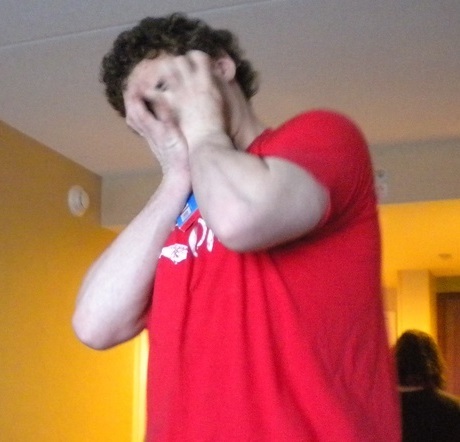For the second time, John Elder Robison has given me new insight into my severely autistic son, Ben, and I'm not sure I like it.
The first time was nine years ago, through his first book, Look Me In The Eye. Author and autism advocate Robison is (or was?) an extremely high-functioning autistic man himself, more than able to describe his own experiences, and giving me a better idea of Ben's internal world.
Robison has become a somewhat polarizing voice in the autism world - but who hasn't? Sadly, it's almost inevitable these days, fractious on many fronts - vaccinations, housing, therapies, community inclusion, definitions, labels, terminology, and simply basic identity. Robison, from what I've seen, hasn't been unnecessarily provocative (at least intentionally - his dog analogy did ruffle some feathers, er, fur). He considers positions other than his own, and I've always found him decent and likable, even when he pisses me off.
And it's why I find a recent New York Times piece about Robison's experiences confronting the emotional world around him for the first time to be heartbreaking -- at least in part. A new and still experimental treatment, TMS -- transcranial magnetic stimulation - was the not quite silver bullet.
I am skeptical in the extreme when it comes to autism, um, treatments, still feeling guilty for having subjected Ben to one of the first mainstream-press autism quackeries that only made him miserable. (Remember Secretin? No? Good.)
But the rigorous TMS study is being done by Beth Israel Deaconess Medical Center of Harvard Medical School, and when Robison refers to TMS for autism as experimental, it is refreshing terminology in a world of mainly anecdotal and self-assured "research."
Overnight, TMS opened Robison to the emotional dimension of humanity. Oh boy.
Fifteen years ago, the late Clara Parks' exceptional book Exiting Nirvana was published. It describes her autistic daughter Jesse's journey to engage with the outside world, requiring her to venture from her internal, safely self-structured "nirvana" into a challenging and frightening place. For Robison, the transition was amplified (using rock 'n' roll terminology the former engineer for Kiss would know), and turned up to 11.
"Emotions," writes Robison, "came at me from all directions, so fast that I didn't have a moment to process them."
Like the stories I have heard through the years, true or apocryphal, about people blind from birth having their sight "switched on" (and Switched On is the title of Robison's new book), the brain isn't prepared to deal with this entirely new stimulus. Things are perceived, but they don't make sense, at least not for a while.
The words Robison uses to describe his experience include "overwhelmed," "scared," "tumult," "unsettled," and "turned my life upside down."
It cost him customers at his business. It wrecked friendships ("I saw teasing in a different and nastier light"). On top of that, "People at work told me they'd liked me better the way I was before."
So did his wife. They divorced a year after TMS. Is it too much to call all of this tragic? (Happily, Robison's since remarried, and his wife and ex-wife became friends.)
If living behind the emotional veil of autism hadn't seemed like nirvana before, I imagine it might've after TMS. For five years.
That's how long Robison said it took him to attain "a new balance and stability."
And I can't help but wonder, what if this were Ben?
Robison is smart, insightful, verbal, and for him, it was overwhelming.
Ben is intellectually disabled. He is minimally verbal. How would he be able, with the developmental age of a little kid, to even begin coping with these experiences?
"[T]here were dreams," Robison writes, "so real they felt like hallucinations." For Ben, a hallucination would be reality.
The rush of impossible-to-process emotions Robison felt? I'm afraid Ben could become uncontrollable, out of his mind from the sheer terror enveloping him.
"Seeing emotion didn't make my life happy," says Robison. "It scared me."
I can't count how many times I have fantasized what it would be like if Ben woke up one morning without autism, able to converse, embrace, engage, and express and receive love and all the other emotions.
I'll probably have those middle-of-the-night fantasies forever, but reading Robison made me realize how much further we really have to go to sort out autism.
Allowing someone to perceive emotions isn't necessarily "curing" autism, but the emotional piece is certainly a huge autism hallmark. It's why I questioned even defining Robison as autistic, post-TMS.
So, as hard as it may be for me to believe, I have to consider whether Ben would be better off emotionally "out here" with us fellow neurotypicals - or not.
"I've learned that the grass is not always greener when it comes to emotional vision," says Robison.
I can accept that. But it doesn't make me feel any "better" about Ben's autism. One of Robison's and my areas of sharp disagreement is whether I (or anyone) should express dislike of autism, since some people with autism consider it a difference and not a disorder. I've said before, I hate our autism for what it has done to Ben and his life. I truly do feel bad if that makes others feel bad, or mad.
If anything, I see Ben's extreme autism as more pernicious still: It really does have him trapped. If Ben could have his extreme autism lifted, what would that be like? Could it be even worse for him? Is it too late?
Clearly, this has been a mixed blessing for Robison. There have been profound benefits, including being able to forge a deeper relationship with his (also autistic and TMS recipient) son, Cubby. At least to neurotypical-me, the switching-on of emotional life, on balance, seems to tilt toward the positive for Robison.
I just don't know which way it would tilt for Ben.
~~~~~
Home: davidroyko.com/
More about Ben: Ben Stories

